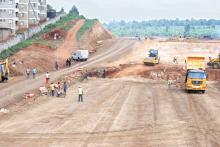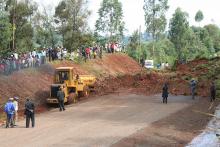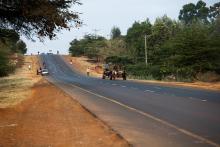Plans to upgrade two major roads in Tanzania will bring huge benefits to the East African nation. Shem Oirere reports Tanzania’s bid to retain or improve its position as East Africa’s second largest economy is gaining momentum as the government moves to support the achieved growth and contribute more to ongoing regional economic integration through the improvement of its transport infrastructure. The country received a major boost in April, 2012, when the African Development Bank (AfDB), one of Tanzania lea
Plans to upgrade two major roads in Tanzania will bring huge benefits to the East African nation. Shem Oirere reports
Tanzania’s bid to retain or improve its position as East Africa’s second largest economy is gaining momentum as the government moves to support the achieved growth and contribute more to ongoing regional economic integration through the improvement of its transport infrastructure.The country received a major boost in April, 2012, when the
The funding paves the way for Tanzania to launch the procurement process for the construction of the 188.1km Dodoma-Babati road and the Tunduru-Mangaka-Mtambaswala road (202.5km).
The roads are listed as priority in the East African Community (EAC) Transport Strategy and Road Sector Development Programme for Tanzania and the country’s own Road Sector Support Project Phase Two, funded by a team of lenders led by AfDB.
According to a project briefing by the bank, the $340 million road projects’ components of civil works, consulting services, capacity building and the compensation and resettlement of people affected by the project will be financed by the AfDB through the African Development Fund (ADF),
Civil works in both roads involve upgrading from gravel to bitumen standards of 6.5m carriageways and 1.5m sealed shoulders on either side, giving a construction width of 9.5m. The approved design for the two roads provides for the widening of the shoulders to 2m in sections where pedestrian and non-motorised traffic is heavy. The design has also provided for a parking lane 3– 3.5m wide along stretches in urban areas.
The road project has been divided into five lots, namely Mayamaya-Mela (99.3km); Mela-Bonga (88.8km) on the Dodoma-Iringa road and Mangaka-Nakapanya (70.5km); Nakapanya-Tunduru (66.5km); and Manyaka-Mtambaswala (65.5km) on the Tunduru-Mangaka-Mtambaswala road.
According to technical engineering design for the Tunduru-Mangaka-Mtambaswala road, the section will have double bitumen surface treatment (DBST) with sealed shoulders on 150mm crushed stone base on a 200mm cement stabilised granular sub-base.
The Dodoma-Babati stretch will have a 50mm surfacing with sealed shoulders on 150mm cement stabilised granular base on 200mm natural granular sub-base, according to the project design details approved by AfDB and Tanzania’s Environmental Management Council.
Vehicular design speed for rural sections of the two roads is 100km/hour while the rolling/hilly terrain and mountainous terrain have design speeds of 80km/hour and 60km/hour respectively.
Both road projects, being executed by Tanzania National Roads Authority (TANROADS), will start in the second quarter of 2013 and be completed after 36 months.
Minister of State in the President’s Office Stephen Wasira says Tanzania’s economy, which grew at an impressive 7% in 2010, before shrinking to 6.4% last year due to prolonged droughts and frequent electricity blackouts, is set for higher growth in the next four years.
Other top ministry officials have lauded the AfDB and JICA financing as a step in the right direction towards elimination of poverty and supporting sustainable economic growth.
“The loan will help contribute to socio-economic development, poverty reduction and integration of the regions of the country through improved transport systems that link centres of economic activity,” said Ramadhani Khijja, Deputy Permanent Secretary Ministry of Finance and Planning in charge of Policy & Resource Mobilisation.
Tanzania anticipates an influx of local and regional investors in the area covered by the roads when they are completed. For example, TANROADS says investment in schools, hotels and medical services is likely to increase with the upgraded roads.
Similarly, there is likely to be an increased in the number of transport operators using the upgraded roads. With quality roads, the cost of transportation is likely to be reduced and so is the travel time.
The region covered by the roads also hosts the world-famous Selous Game Reserve, said to be one of the largest faunal reserves of the world. It is named after Englisman Sir Fredrick Selous, a big game hunter and early conservationist.
According to Once in A Lifetime Safari, one of East Africa’s tourism companies which provides adventure services for tourists in the region, the road project will be a major boost to the Tanzania tourism sector.
One of the obligations of the financier and the Government of Tanzania is to educate drivers on effective measures to reduce road accidents.
Traffic along the two roads is anticipated to increase after 2016 from current levels. At least 1,500 jobs will be created when the construction of the roads starts, 80% of them awarded to local people. After the completion of the two roads, at least 300 routine maintenance jobs will be created according to AfDB’s project brief.
Tanzania requires $4 billion to successfully implement a road expansion and improvement programme under its five-year development plan for 2012-2016, dubbed Unleashing Tanzania’s Latent Growth Potential and which has been prepared by the Planning Commission in the Office of the President.
Under the plan, Tanzania hopes to construct and rehabilitate a total of 5,200km by 2015.








